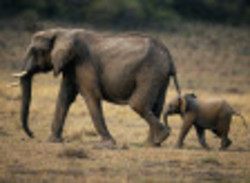We will either compel mass extinction or mass protection for wildlife.
Every few years, the Conference of the Parties meets at the Convention on International Trade in Endangered Species to decide the fate of a number of species.
I argue that allowing trade in endangered species leads to the unintended consequence of essentially "giving permission" to poach and potentially wipe that species out to extinction.
We already know from history that allowing trade in an endangered species increases the number of "illegal" kills and poaching. We know that allowing some trade in elephant tusks or rhino horn, even if it was legally acquired, simply perpetuates and hastens the poaching of these already highly poached species.
History also shows us that a complete and total ban on the trade of this "commodity," for example tusks, will almost entirely cease the poaching crisis. When these items are completely banned and illegal to trade there is essentially no incentive for poachers to kill that animal.
A recent CNN article reported a rapid decline in African elephants, with far fewer than unexpected, demonstrating that any trade in ivory fuels ongoing poaching and destruction of this species. Elephants are highly social, living in family groups, led by a matriarch. These elder matriarchs guide the herd, lead them to watering holes, and ensure safety of the herd. Unfortunately, these elder matriarchs also have very large tusks.
When these matriarchs are maimed and murdered for their tusks, the family grieves, falls into disarray, and has a significantly lower chance of survival.
Humans have great capacity for showing love, empathy, and stewardship. But, we also have great capacity for destruction.
One of the major differences between humans and almost any other animal is how we have adapted our use of tools. For humans, tools are not just devices that help us obtain food or for grooming like they are for other animals. Rather, we have created tools that can destroy hundreds of thousands of trees every hour, kill thousands of fish and other marine species in minutes, and kill roughly one hundred elephants each day.
We no longer use tools just for beneficent purposes. Now we use tools on a global scale that often reap mass destruction.
Therefore, I call upon the Conference of the Parties (CoP17), CITES, to search inside their empathetic hearts, to use their moral and ethical compass, not the bottom dollar, to adequately and appropriately decide the fate in trade of wild, endangered animals, most of which, if not all, evolved into their special niche before we even showed up on the planet.
We know current rates of extinction are over 1,000 times that of the background rate. We know that humans are the primary contributor to the precipitous declines in species.
While I believe it is arrogant for us to be sitting in a room deciding the fate of a species that simply wants to live, that simply wants to be with its family doing the things it knows how to do; I also understand that this is the way of today's world, where humans do get to determine the fate of animals.
Thus, I can only appeal to people's sense of empathy, their sense of right and wrong, and their ability to be "decision-makers."
Let us choose to be on the right side of history. Let us choose to ban the trade of endangered animals, and animals that will become endangered should we continue to allow their trade. It is time to let animals be animals, to live without fear; to live, PERIOD.

